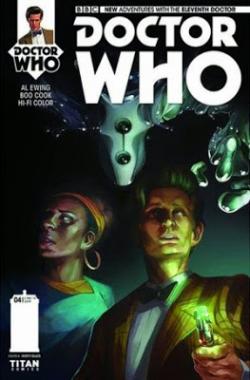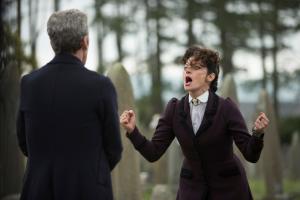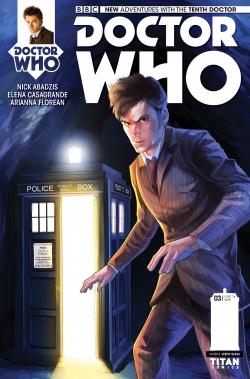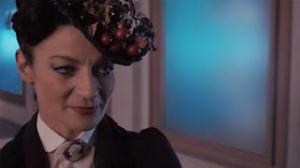Mask of Tragedy (Big Finish)
Outside Athens’ walls the Peloponnesian War rages, and a horde of Spartan warriors (described by the Doctor as "like the Daleks, but with better hair") are preparing to sack the city. Inside the walls, a strange sickness stalks citizens and slaves alike, turning them into mindless zombies; and a winged fury haunts the Tyrant of Athens, the tormented Cleon (Alisdair Simpson).
In the words of the poet Sophocles:
"Ah me! it is a world, a world of woe,
Plague upon the height and plague below!"
Or as Goss puts it, speaking through playwright and comedian Aristophanes (Samuel West), this story’s major supporting character: "Basically, it’s the end of the world.".
Mask of Tragedy is that relatively rare Big Finish release, a comedy; a wry, knowing, bawdy and clever comedy that balances camp quips with dark undercurrents in a way that recalls such classic Doctor Who stories as The Sun Makers and Revelation of the Daleks.
As with the comedies of Aristophanes (c. 446 – c. 386 BC), that humour is sometimes dragged down by the occasional cheap laugh that reminds listeners why everyone from Wilde and Faulkner to Arthur Quiller-Couch urged writers to "kill their darlings" (the most groan-inducing example being the line, "Is it a bird? Is it an astral plane?") but for the most part it’s a smart, even sophisticated script that takes every opportunity to celebrate Goss’ love for Aristophanes’ contributions to the theatrical canon, as well as the foibles of the theatre in general.
Continuing the playfully self-aware approach to storytelling that has become a trademark of Goss’ writing, from Torchwood spin-off novels Almost Perfect and Risk Assessment to his tenth Doctor audio Dead Air, the adventure’s structure reflects classic Greek proscriptions around the need for all plays to have a hero, a villain, and a chorus, with Ace often playing the latter role. Much of the script is presented in extended flashbacks, framed by narrative sections which heighten the listener’s awareness of actively listening to an audio drama. Goss also successfully and meta-theatrically plays with the listener’s awareness of common Doctor Who tropes, such as the Doctor’s exasperation over Ace once again stuffing up his plans by taking action at the wrong moment, or the Time Lord’s sudden realisation that he neglected to listen to one of his companions when they were telling him something important.
Indeed, even the citizens of Athens in Mask of Tragedy seem hyper-aware of the nature of the universe they live in: apparently ancient Greece is a hotspot for temporal tourists. As Aristophanes succinctly notes: "We get visitors all the time. From all of time."
Mask of Tragedy sees a return to the Machiavellian Doctor whose long games were so successfully represented in the Virgin New Adventures, even as Goss leavens his script with jokes that writers in particular will enjoy, such as Aristophanes’ faux-exasperated complaints about the popularity of his base comedies: "Hack work. But alas people do seem to like them."
Supporting characters, ranging from time-travelling theatre-luvvie, Tyrgius (Russell Bentley) to a surprisingly sympathetic portrayal of Cleon, are well developed, though a cameo from the slave-girl Lysistrata (Emily Tucker) is tantalisingly brief.
Goss also writes Hector well, making the recently changed relationship between the current TARDIS crew feel genuinely fresh – such as an early scene, when in response to Ace telling Hector that she and the Doctor care about him Hector replies, "You don’t even know me!" And indeed they don’t know him well; not his new personality at least.
This new Hector gets a chance to spread his wings in this adventure (as does Tyrgius); certainly more than in the previous month’s lacklustre Revenge of the Swarm. Here Hector tries to become a hero in response to what he sees as the Doctor’s indifference to the plight of Athens – with predictably unfortunate results. That said, for someone whose only known memories are as life as a petty Liverpool gangster, Hector is still a relatively passive character – perhaps suggesting that Hex’s lost memories are not all that lost after all?
Not every aspect of this audio adventure is entirely successful: Ace is written as strangely naïve as she leads the Spartan army into Athens, and some of the line readings – such as Philip Olivier’s Jim Carrey-esque exaggerations when wearing the artefact that is this story’s titular McGuffin – are a trifle grating, though perhaps deliberately so given the Mask in question. Too, Richard Fox and Lauren Yason’s sound design is not always successful; for instance the invading Spartan army’s cheers seem distinctly masculine, despite the fact that said army is written as female. The pair’s score, however, is far more impressive, a convincing pastiche of traditional Greek music that makes excellent use of percussion to ramp up the intensity of the drama.
Though it may be a trifle too light-hearted and self-aware for every taste, for this fan, Mask of Tragedy is one of the strongest Big Finish releases of 2014: a playful, intelligent and engaging homage to the dramatic structures and characters that have made Doctor Who – and Greek drama – a lasting success for so many years.










